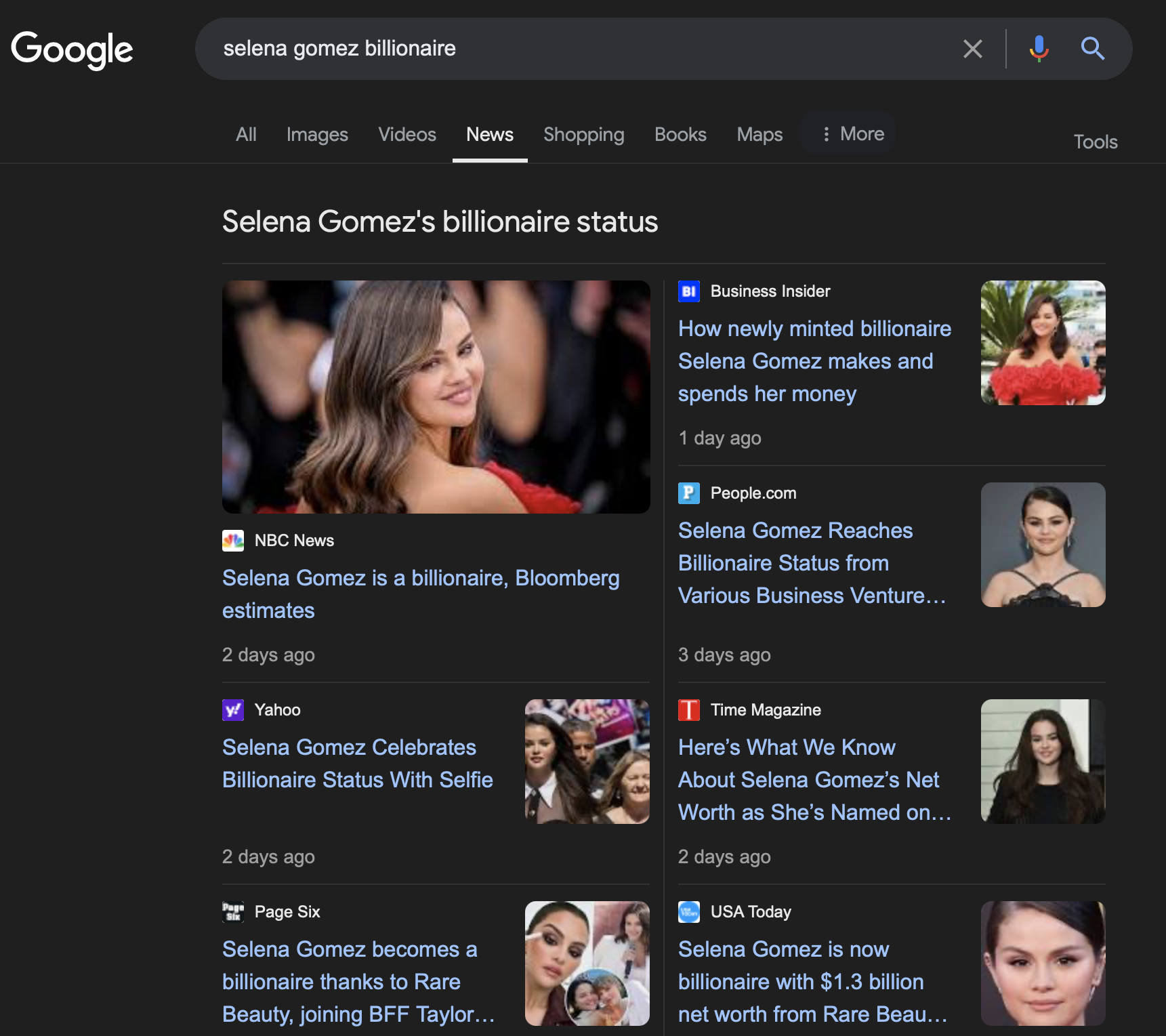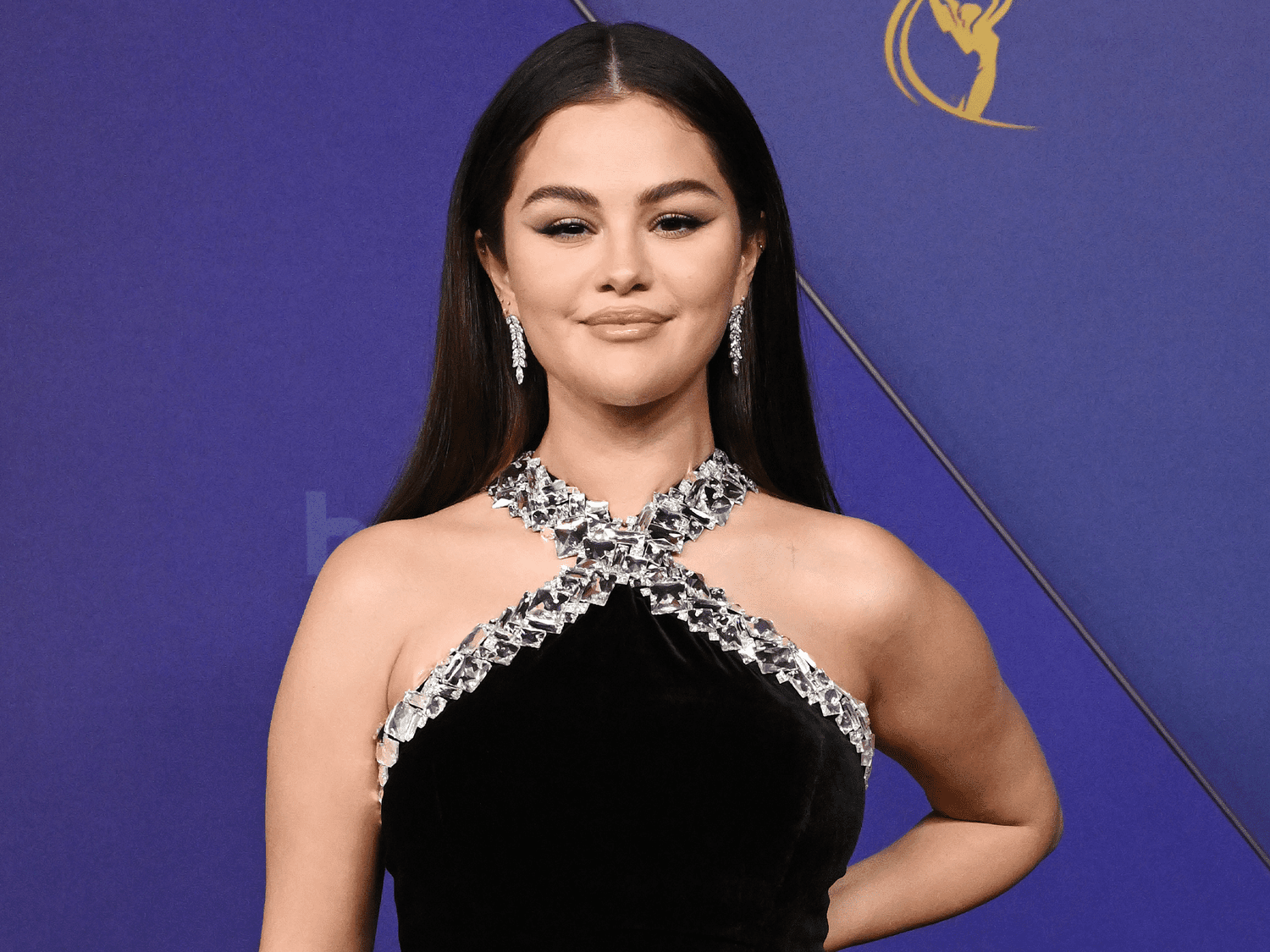09.17.2024 | By Jack Rico |
In a year when the economy has had many of us on edge, Selena Gomez, 32, recently became the first Latina self-made billionaire in America. This monumental achievement, largely due to her beauty brand Rare Beauty, should have been a major celebration. But if you look at the headlines from major outlets like Bloomberg and even Latino media, you’ll notice something missing: her Mexican-American identity.
Nowhere is Selena’s heritage mentioned in the press coverage of her new billionaire status, which raises eyebrows and some important questions.

[Fig 1: Google Search Results, Sept 17, 2024]
Selena Gomez Latina Billionaire: Media’s Erasure of Her Mexican-American Identity
The media has a habit of whitewashing success stories to make them more “universal,” and Selena’s story isn’t an exception. One quick Google search (Fig.1) will show you exactly how the media sees her—not as a Latina, but as “universal,” a figure who transcends cultural boundaries. For many that might sound ideal, but here’s why it’s not:
– It contributes to the erasure of Latino culture.
– Deprives young Latinas of a role model who reflects their identity.
– It promotes a “colorblind” narrative that preserves the myth that hard work alone determines success, ignoring the real challenges Latina women still face in society today.
By glossing over her Mexican-American heritage, the media is making Selena’s success seem like an isolated event instead of the cultural breakthrough it really is.
Why Selena Gomez’s Journey as a Latina Billionaire Matters for Latinas
This omission is newsworthy because Latinas remain severely underrepresented in the upper echelons of American wealth and power. In fact, only 39% of Latina business owners secure approval for bank loans, all while facing the widest pay gap of any group of women in the U.S. workforce. Latinas also have an average net worth that is less than 1% of the average white man’s. (Fig. 2: Net worth comparison between Latinas and other demographics).

(Fig. 2: Net worth comparison between Latinas and other demographics).”
Selena Gomez’s billionaire status is extraordinary, particularly when compared to the net worth of other self-made women in America. According to the Forbes 2024 America’s Richest Self-Made Women list, which ranks the top 100 wealthiest self-made women in America, there are no Latinas.
In an economy where access to capital determines whether you make it or not, this level of exclusion is devastating. What’s even more concerning is how this error goes unaddressed inside newsrooms.
A Tale of Two Celebrations
Latina success stories, particularly in the realm of wealth creation, are almost nonexistent. The erasure of Gomez’s Latina identity becomes even more striking when we see how the media covers other billionaires of color. When Rihanna became a billionaire through Fenty Beauty, many articles celebrated her as a Black woman succeeding in a predominantly white industry. Oprah Winfrey’s rise to billionaire status is deeply connected to her identity as an African American woman overcoming systemic barriers.
In both cases, the media highlighted their achievements in the context of their identities. The lack of such framing for Gomez raises questions about how Latina success stories are covered.
Selena’s Complex Latina Identity
Selena’s relationship with her Mexican-American heritage is complex and evolving. The question that needs to be asked is: does she want to be portrayed this way, or is the media erasing this aspect of her success without her consent? In an interview with ShowBizCafe in 2013, she explained the exact reason she didn’t speak Spanish fluently:
“I don’t know it very well because my dad’s side of the family, which is the Mexican side, they are in Texas and I’m always traveling and I’m working so it’s very hard for me to stay communicated.”
Like many second-generation Americans juggling careers and multicultural identities, Gomez acknowledges the importance of keeping her Mexican-American heritage alive, but candidly admits her Spanish skills have suffered in the whirlwind of stardom:
“It’s a shame… I should know [Spanish] better than I do… I can understand a whole conversation, it would just be hard for me to piece the response back.”
Whether Gomez embraces the role of a Latina icon or not, she connects with millions of young Latinas searching for role models, especially those as successful as her, in spaces where they are scarce.
Latino Media’s Missed Opportunity
Perhaps more perplexing is the lapse from Latino media outlets. With Hispanic Heritage Month here, it is surprising, even bizarre, for them not to have capitalized on this moment. It raises an uncomfortable question: Have we internalized the mainstream’s erasure of our own identity?
When we fall short like we did here, we reinforce the idea that Latino identity is disposable in American society. Selena’s achievement as a Mexican-American woman isn’t filler news – it’s the story. We can’t let our role models be whitewashed by mainstream media like this. We must act as a watchdog, ready to hold them accountable when necessary.
Time To Take Back Our Story
The broader implications of this whitewashing affect how American society sees and values Latinos. Society often celebrates us when we conform to white-dominant norms, but the moment we fully embrace our ethnic identity, they treat us as ‘other,’ as if our success falls outside the scope of interest for mainstream audiences.
Selena Gomez’s story matters as the first American Latina self-made billionaire. Her success holds cultural significance for Latinas across the country, offering a rare and empowering example of a Mexican-American woman achieving significant success. Both mainstream and Latino media must tell the full story and challenge the status quo. This isn’t something just worth celebrating, it’s something worth fighting for.
For more deep thinking conversations like this, check out our Highly Relevant Podcast and the Brown & Black Podcast.
Q: Who is the first Latina billionaire?
A: Selena Gomez recently became the first Latina self-made billionaire in America, largely due to the success of her beauty brand, Rare Beauty.





























